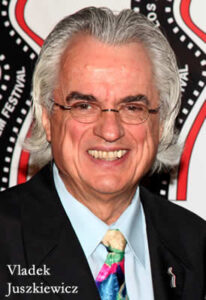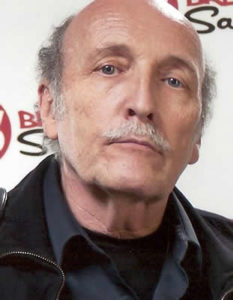Cinema Without Borders is proud to present MOZAIK Bridging The Borders Award for the 14 year at the prestigious SEEfest, South East European Film Festival LA. MOZAIK Bridging The Borders Award offered by Cinema Without Borders and sponsored by MOZAIK Philanthropy goes to a feature film that helps bringing people of our world closer together. Winner will be announced on May 4th during the closing ceremony of the 17th Edition of the festival at the Fine Arts theater. SEEfest will run from April 27th to may 4th.
Jury members for MOZAIK Bridging the Borders Award are:
 Susan Morgan Cooper
Susan Morgan Cooper
Susan Morgan Cooper is a Director/Producer/ Writer and her credits include:
To the Moon and Back, Documentary, Director/Producer/Writer 2016 (A cinematic act of love and courage’ … Broadway World) – Hopper [In his own words] Documentary, Producer/Writer 2013 (“I was moved to tears” Mike Medavoy) – Mulberry Child, Documentary, Director/Producer/Writer 2012 (‘A powerful and touching film’… 31/2 stars. Roger Ebert) – An Unlikely Weapon [The Eddie Adams Story]..Documentary, Director/Producer/Writer 2008 ( ‘A terrific documentary’ The Hollywood Reporter) – Making Of Shadows in The Sun, Documentary, Director/Producer/Writer 2005 – Heroes And Sheroes. Television Series, Director/Producer/Writer 2000
Mirjana: One Girl’s Journey, Documentary, Director/Producer/Writer 1997 – Stringers, Narrative Short Director/Producer/Writer 1990 – Hadley’s Rebellion, Narrative Feature Associate Producer 1989
 Hermon Farahi is an award-winning, first-generation Iranian Korean American filmmaker, author, scholar-activist, social impact strategist, multidisciplinary creative director, and former candidate for U.S. Congress (NV-03), trained as a cultural anthropologist and documentarian grounded in critical race theory and decolonial praxis (MA, The George Washington University). His lived experience raised in a multicultural immigrant family has deeply informed his work as a storyteller and change-agent. Faced with family separation due to the “Muslim ban”, Hermon was inspired to run for Congress, ultimately suspending his campaign to work on the Emmy-nominated, Academy Award-shortlisted Netflix Original Documentary, Knock Down The House, winner of the 2019 Sundance Film Festival Favorite Award. Genuinely committed to inclusion and antiracism, Hermon has collaborated with many impacted BIPOC communities, locally and globally. As a senior advisor to Rep. Cori Bush, Hermon’s polymathic skill-set helped propel her campaign to a historic victory over a 52-year political dynasty to become Missouri’s first Black Congresswoman. His award-winning feature debut, When They Awake, a decolonial indigenous music documentary, has screened in 50+ International Film Festivals. He has consulted for several grassroots and international organizations, including The World Bank and USAID, and even traversed Mt. Everest while filming for a cancer foundation.
Hermon Farahi is an award-winning, first-generation Iranian Korean American filmmaker, author, scholar-activist, social impact strategist, multidisciplinary creative director, and former candidate for U.S. Congress (NV-03), trained as a cultural anthropologist and documentarian grounded in critical race theory and decolonial praxis (MA, The George Washington University). His lived experience raised in a multicultural immigrant family has deeply informed his work as a storyteller and change-agent. Faced with family separation due to the “Muslim ban”, Hermon was inspired to run for Congress, ultimately suspending his campaign to work on the Emmy-nominated, Academy Award-shortlisted Netflix Original Documentary, Knock Down The House, winner of the 2019 Sundance Film Festival Favorite Award. Genuinely committed to inclusion and antiracism, Hermon has collaborated with many impacted BIPOC communities, locally and globally. As a senior advisor to Rep. Cori Bush, Hermon’s polymathic skill-set helped propel her campaign to a historic victory over a 52-year political dynasty to become Missouri’s first Black Congresswoman. His award-winning feature debut, When They Awake, a decolonial indigenous music documentary, has screened in 50+ International Film Festivals. He has consulted for several grassroots and international organizations, including The World Bank and USAID, and even traversed Mt. Everest while filming for a cancer foundation.
 Vladek Juszkiewicz
Vladek Juszkiewicz
Born in Glasgow, Poland. He graduated from the Szczecin Technical University with a degree in Engineering. While attending the University he became a member of The Szczecin Technical University Choir, serving as a President and manager of the group. His travels with the choir to 18 counties including United States where he visited the White House.
When he moved to Warsaw, he became the manager of the Polish international star singer Maryla Rodowicz.
After immigrating to the United States, he worked on 11 films with the late Paul Leder.
In 1999 he founded the Polish Film Festival Los Angeles and served as a director till 2019. Now is serving as the Festival’s Programmer.
Served on the juries of the Los Angeles Hungarian Film Festival, the Los Angeles South East European Film Festival, New York Polish Film Festival and Palm Springs International Film Festival.
Awarded by Polish Government with the Cavalier & Officer Cross of the Order of Merit of the Republic of Poland and Gloria Artis for promoting Polish culture abroad.
 Chale Nafus was born in Dallas during World War II, he attended public schools, spent summers on his sister’s ranch in Comanche County in the 1950s, learned Spanish from schoolmates, and dreamed of getting out of Dallas. After getting through freshman year at SMU, he worked at Texas Instruments before realizing he really needed a college education. After attending the University of Texas at Arlington (B.A., English), La Universidad Autónoma de México, and UT Austin (M.A., English/RTF), he began a long college teaching career at Texas Southmost College (Brownsville), La Universidad de Puerto Rico at Mayaguez, Borough of Manhattan Community College, Kingsborough Community College (Brooklyn), and finally Austin Community College (1973-1998). At the latter, he founded the Department of Radio-TV-Film, taught classes in film studies, and for seven years served as Chair of Humanities (Northridge Campus). Retiring in 1998, Chale spent 4 years traveling and writing before joining the staff of Austin Film Society as Director of Programming (2002-2015). He is now totally retired and happily serving on the boards of Austin Film Society and OUTsider Fest as well as the advisory committees of IndieMeme (South Asian film organization) and Cine Las Americas.
Chale Nafus was born in Dallas during World War II, he attended public schools, spent summers on his sister’s ranch in Comanche County in the 1950s, learned Spanish from schoolmates, and dreamed of getting out of Dallas. After getting through freshman year at SMU, he worked at Texas Instruments before realizing he really needed a college education. After attending the University of Texas at Arlington (B.A., English), La Universidad Autónoma de México, and UT Austin (M.A., English/RTF), he began a long college teaching career at Texas Southmost College (Brownsville), La Universidad de Puerto Rico at Mayaguez, Borough of Manhattan Community College, Kingsborough Community College (Brooklyn), and finally Austin Community College (1973-1998). At the latter, he founded the Department of Radio-TV-Film, taught classes in film studies, and for seven years served as Chair of Humanities (Northridge Campus). Retiring in 1998, Chale spent 4 years traveling and writing before joining the staff of Austin Film Society as Director of Programming (2002-2015). He is now totally retired and happily serving on the boards of Austin Film Society and OUTsider Fest as well as the advisory committees of IndieMeme (South Asian film organization) and Cine Las Americas.
 Bijan Tehrani
Bijan Tehrani
Bijan Tehrani a film director, film critic and writer, works as Editor in Chief of Cinema Without Borders and President of Cinema Without Borders Foundation. Bijan has won several awards in international film festivals and book fairs for his short films and children’s books. He has been writing film critics for several publications during the last four decades.
For the tenth anniversary of Cinema Without Borders, Bijan has received Ambassador of International Cinema Award from South east European Film Festival, Friend of the Festival Award from Polish Film Festival, LA and Gateway to International Cinema.
Nominees for MOZAIK Bridging The Borders Award are:
AS FAR AS I CAN WALK (Serbia, Luxembourg)
DIRECTOR: Stefan Arsenijević
A re-imagining of a traditional medieval love epic in which contemporary African migrants take the place of Serbian iconic literary heroes. Urgent and timeless at the same time, the adaptation raises questions about identity, tradition, race and love. The film was awarded the Crystal Globe, top prize of the Karlovy Vary Festival in 2021.
BLINDFOLD (Ukraine)
Director: Taras Dron
The 2014 war in Eastern Ukraine has ended, and the country is trying to return to regular life. Julia, a young MMA fighter, lost her fiancé in the war. Struggling with her image of a war hero’s widow, she quits the sport and starts a new relationship when suspicious news arrives that her fiancé might be alive and returned from captivity, albeit for a hefty sum. Julia and her fiancé’s mother have one night to find the money. Will Julia go along with the doubtful scheme, or find the strength to leave the past behind?
BLUE MOON (Romania)
Director; Alina Grigore
The film follows a girl’s psychological journey as she struggles to achieve higher education and escape the suffocating work at the mountain resort. The undercurrent of emotional violence within her extended dysfunctional family turns Irina from victim into abuser as she stumbles to find her path in an environment rife with mistrust and conflict.
An ambiguous sexual experience gives her the strength to stand up to the violent males in her family. As Irina’s coming of age story unfolds, the larger backdrop paints a stark picture of a family divided between those who went to find the riches abroad and their offspring left behind to tend to the family business in the countryside. Winner of the San Sebastian Festival 2021.
KLONDIKE (Ukraine, Turkey)
Director: Maryna Er Gorbach
The story is centered on a Ukrainian husband and wife living on the border of Ukraine and Russia during the start of the 2014 war. Irka, who is heavily pregnant, refuses to leave her house even as the village gets captured by armed forces. To make things worse, they find themselves at the center of an international air crash catastrophe on July 17, 2014. Directing award at Sundance Festival in January 2022.
MURINA (Croatia, Brazil, United States, Slovenia)
Director: Antoneta Alamat Kusijanović
Tensions rise between restless teenager Julija and her oppressive father Ante when an old family friend arrives at their Croatian island home. As Ante attempts to broker a life-changing deal, their tranquil yet isolated existence leaves Julija wanting more from this influential visitor, who provides a taste of liberation over a weekend laid bare to desire and violence. Executive produced by Martin Scorsese, the film features outstanding camerawork by Hélène Louvart (The Lost Daughter, Happy as Lazzaro). Director Kusijanovic won Camera d’Or in Cannes last year for her stunning debut.
PERPETUITY (Hungary)
Director: György Pálfi
In this dystopian tale, in the near future instead of shooting stars, planes are shooting from the sky, and instead of feelings, bullets delirium-cursed hit the heart. All that is left is to try and find the right way to connect to others in a futureless world. Directed with aplomb by the filmmaker known for his unique vision and fearless storytelling, Perpetuity blends sci-fi and horror in a potent cinematic mix.
SUGHRA’S SONS (Azerbaijan, France)
Director: Ilgar Najaf
The women do the work in a remote village while the men are fighting in WWII. A small group of deserters is hiding in the mountains and when Musa joins them, his little brother Bahtiyar acts as the liaison between the men and the village. When Barat, the lewd head of the kolkhoz, is killed by the deserter Ahad, the KGB arrive to look for the deserters and life for Sughra and Bahtiyar takes yet another dramatic turn.

